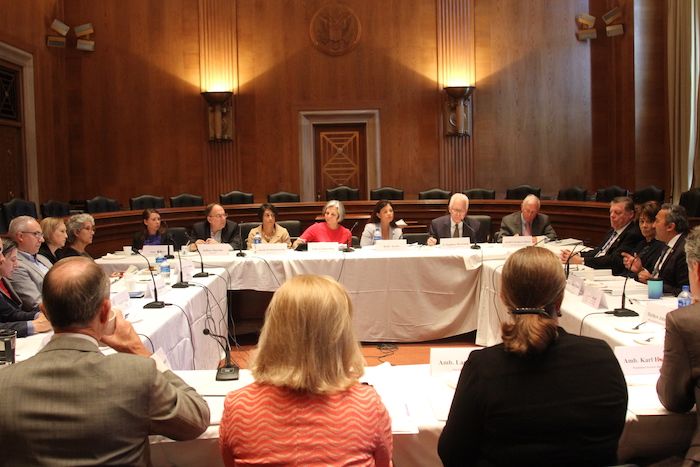Commission Co-Chair Statement on the 3rd Meeting of Commission Members
Kelly Ayotte and Julie Louise Gerberding, M.D., MPH. "Commission Co-Chair Statement on the 3rd Meeting of Commission Members." CSIS Commission on Strengthening America's Health Security, Center for Strategic and International Studies, August 08, 2019. Accessed October 01, 2025. https://healthsecurity.csis.org/articles/commission-co-chair-statement-on-the-3rd-meeting-of-commission-members/

On June 26, 2019, the CSIS Commission on Strengthening America’s Health Security convened for the third time since its launch in April 2018. The Commission’s core aim is to chart a dynamic and concrete vision for the future of U.S. leadership in global health security—at home and abroad.
Today we face an escalating, uncontrolled crisis in the Democratic Republic of the Congo (DRC). More than one year after the Ebola outbreak began, it has just recently been declared a global emergency. The virus continues to spread and threatens to spill into neighboring countries and beyond. Progress has been stymied by community resistance and mistrust, combined with opaque targeted violence against health providers. On June 25, the Commission convened a dinner discussion focused on this burgeoning crisis. One stark conclusion emerged: we will not see a turnaround in the DRC until there is a much higher-level and more determined effort by the United States, other major powers, and African states to overcome disorder and violence in the DRC. We will see in other places in the future what we are currently witnessing in the DRC, and we simply must be better prepared.
On June 26, Commission members—a diverse group of high-level opinion leaders who bridge security and health and the public and private sectors, including six members of Congress—met to discuss a proposed U.S. doctrine for global health security. Commission members deliberated and reached a broad consensus endorsing a doctrine of continuous prevention, protection, and resilience, which would protect the American people from the most pressing global health security threats we face today. The measures outlined in the paper are affordable, proven, and draw support from across the political spectrum. The time to act is now.
The doctrine calls for Congress and the administration to act on seven fronts:
- Press for the restoration of health security leadership at the White House National Security Council. Strong, coherent leadership at the National Security Council is essential to ensure greater oversight of global health security and biodefense policy and spending, and to have confidence that there is a reliable White House chain of command when dangerous pandemics strike.
- Ensure full and sustained, multi-year funding for the Global Health Security Agenda. The U.S. government can best protect the American people by stopping outbreaks at their source. The Global Health Security Agenda (GHSA) has a proven track record in building health security preparedness in low- and middle-income countries. That success should be carried forward.
- Ensure ample, quick-disbursing finances. Speed is essential. Stopping a global health security crisis requires fast, early action. Congress should increase contingency fund levels for the CDC’s Infectious Diseases Rapid Response Reserve Fund and the U.S. Agency for International Development’s (USAID) Emergency Reserve Fund for infectious disease outbreaks.
- Use multilateral tools to incentivize countries to invest in their own preparedness. Country ownership is essential to long-term capacity building. Congress should press for expanded action by the World Bank to incentivize greater investment by low- and lower-middle-income countries in their own basic health security capacities.
- Establish a global health crises response corps. U.S. civilian experts must be able to deploy rapidly and safely into public health emergencies that appear suddenly in disordered settings where grave health security threats lurk. We simply cannot afford to confine these experts to the margins. A dedicated corps, under White House direction, can integrate existing rapid response teams at the CDC and USAID. With special training and support, the corps will be able to operate in insecure settings to stop outbreaks at their source.
- Strengthen the delivery of services in disordered settings. The United States should strengthen, focus, and adapt existing programs and capacities to ensure delivery of a broad range of health services in disordered settings, including maintaining immunization delivery, and providing protection against gender-based violence as well as reproductive health and family planning assistance to acutely vulnerable women and girls.
- Secure new tools for the future. It is essential to plan strategically, with strong private sector partners, to support targeted investments that will accelerate the development of the most promising technologies. Priorities are to include a universal flu vaccine; new antibiotics; and expanded research of emerging infectious diseases and biosafety. In response to rising vaccine hesitancy, Congress should press for the U.S. government to intensify and scale up its work to strengthen vaccine confidence, trust, and demand.
The final paper providing greater detail on the doctrine and proposed recommendations, Ending the Cycle of Panic and Complacency in U.S. Global Health Security, will be released in full in the fall of 2019. Over the course of the fall, Commission members will brief congressional and executive audiences on the findings and recommendations.